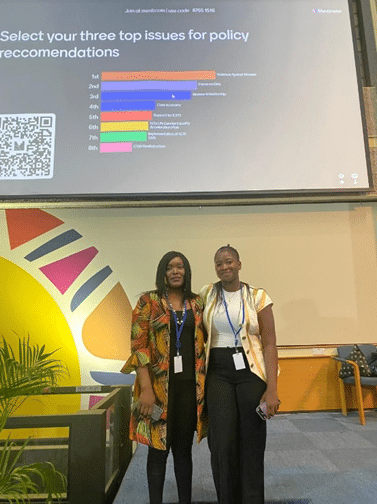From Nairobi to New York – what reasons to be hopeful for women’s equality at the Summit of the Future
22 September 2024
The Summit of the Future, championed by the UN Secretary-General, is upon us. International organizations, civil society, and member states have been anticipating this event. With the goal of addressing global challenges since the SDGs were negotiated, we must ask: Will the Pact truly advance the rights of women and girls, and promote gender equality?
At Women in Global Health, we sought insights from our delegation that attended the United Nations Civil Society Conference in Nairobi, held on 9-10 May 2024. This conference, a precursor to UNGA 79 and the Summit of the Future, was the first of its kind in the Global South. Habibou Ouedraogo from WGH Burkina Faso shared her reflections on this significant location change and how it broadened perspectives.

Two WGH delegates from Burkina Faso and Kenya at UNCSC in Nairobi
1. You participated in the UN Civil Society Conference on May 9-10th in Nairobi. What were your takeaways on the UN’s effort to include civil society in the Summit process?
Habibou: For the first time in history, the conference was organized in an African country, which to a certain extent allowed more civil society organizations to attend, especially those from the Global South. It also offered a unique opportunity for CSOs to feed into the Pact of the Future through debates, demonstrations, and the creation of coalitions to call for action and add to what was missing and needed to be revised in the Pact of the Future. More than 2,000 civil society organizations (CSOs) worldwide representing more than 115 countries.
More importantly, the conference enabled discussions on key issues such as gender equity, youth, sustainable development, peace and security. For Women in Global Health, we took the opportunity to reaffirm our commitment towards gender equity and Universal Health Coverage, advocate for gender progressive policies, share some of the initiatives the Burkina Faso and Kenya Chapters are currently leading in this regard such as training sessions, and network with like-minded organizations.
Women in Global Health will be engaging at global and national levels, sending a diverse group of delegates to the UN General Assembly for the Summit of the Future. The Summit’s outcome document, the Pact for the Future, must reflect commitments made to the rights of women and girls and gender equality.
2. What did the UNCSC in Nairobi do to move the needle in addressing the rights of women and girls, in your opinion?
Habibou: A short-term win was the platform for CSOs to exchange best practices on women’s and girls’ issues. During gender coalition meetings, CSOs voted to prioritize policy recommendations, with violence against women, girls’ rights, and women’s leadership being top concerns. Another success was the creation of a health coalition, addressing a gap in the original 20 ImPACT coalitions. The closing ceremony was a beautiful way to address this gap as a demonstration was organized whereby people were supporting the creation of a health coalition with many CSOs including WGH being members of the coalition.
The Women in Global Health delegation for the United Nations General Assembly 79 and Summit of the Future have a diverse set of skills and expertise as medical professionals and longtime advocates for women’s health and rights for women and girls.
3. As the delegates pack their bags and head to New York City, what advice do you have for them? What can our delegation do at UNGA and Summit of the Future to remain committed to working with all stakeholders to ensure a Pact for the Future truly advances gender equality and the well-being of all?
Habibou: One of the key takeaways that stood out for me during the conference is this quote from a panelist at a conference organized by Fos Feminista and stating “We don’t necessarily need more events for CSOs but rather platforms that will offer them better engagement and opportunities to fully contribute to decision making”. Along the same line, I would say let’s continue to be proactive and specific in our advocacy messages, especially on universal health coverage and gender equity, an essential component in achieving the Sustainable Development Goals. There are a lot of best practices that can be learned from organizations in other countries. So, leveraging this opportunity would help in a collective effort and in avoiding duplications to better reach our goal for gender equity and universal health coverage.
Summit of the Future at UNGA 79, here we come!
Our voices will continue to push for progress in the Beijing+30 processes, and the Summit of the Future is just one step in our ongoing advocacy. While some UN member states still rely on outdated gatekeeping, Women in Global Health will work with all stakeholders to ensure the Pact for the Future advances gender equality and well-being for all. The current shortcomings remind us of the need to strengthen the UN and make new commitments that address modern challenges. Now is the time to transform multilateralism through decolonization, feminist leadership, and inclusivity.